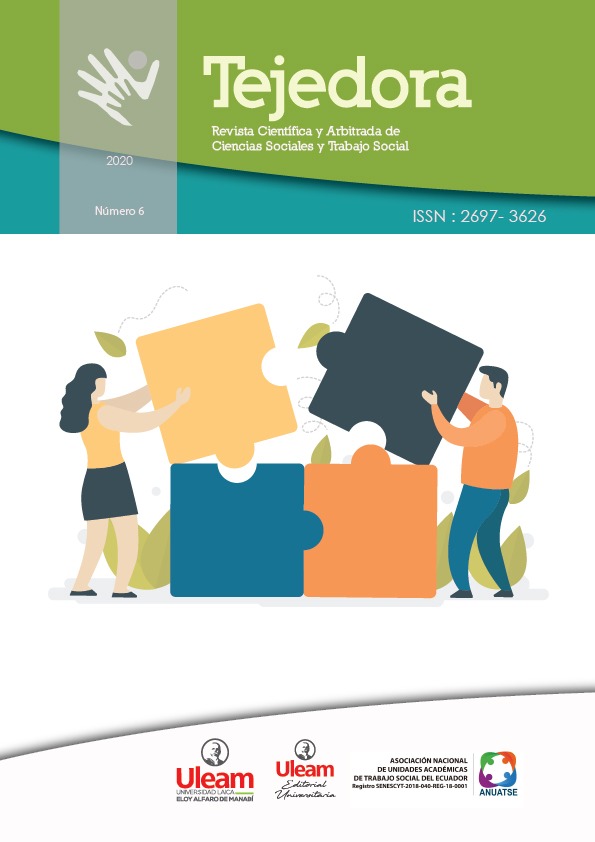DEFICIÊNCIA E INFLUÊNCIA NO ESTADO EMOCIONAL DE ADULTOS IDOSOS
DOI:
https://doi.org/10.56124/tj.v7i15ep.003Palavras-chave:
calidad de vida, emociones, disfunción familiarResumo
A pesquisa parte da necessidade de compreender como a deficiência influencia o estado emocional dos idosos e busca identificar fatores que afetam essa faixa etária. Existe uma relação complexa entre deficiência e estado emocional, o que pode predispor a problemas de saúde mental, como ansiedade e depressão. O objetivo geral deste estudo é analisar as causas da deficiência e sua influência no estado emocional de idosos que vivem na paróquia de Tupigachi (GAD), cantão de Pedro Moncayo, província de Pichincha, explorando como essa condição física, auditiva, intelectual e outras afetam o bem-estar emocional. A metodologia utilizada incluiu uma abordagem quali-quantitativa, por meio de entrevista estruturada com 20 idosos com diferentes tipos de deficiência, o que permitiu analisar suas vivências e percepções sobre sua qualidade de vida emocional. Os resultados indicaram que nessa faixa etária a origem da deficiência é pós-natal e suas principais causas foram acidentes no trabalho agrícola, quedas, exposição ao frio, acidentes por consumo de álcool, da mesma forma ao aplicar o Teste HAD foi identificado que há 8 casos de ansiedade e depressão, por fim ao aplicar o Teste de Apgar Familiar foi identificado que há um alto índice de disfunção familiar, e diante disso o trabalho social determinou ações lúdico-recreativas para idosos com deficiência que contribuíssem para melhorar seu estado emocional no primeiro semestre de 2024.
Downloads
Referências
Aristizábal, K. (2021). Cuando hablamos de discapacidad, ¿de qué hablamos?: Una revisión teórica y jurídica del concepto. Civilizar, 21(40), 59-72.
https://doi.org/10.22518/jour.ccsh/2021.1a05
Bastidas, R. & Matute, L. (2023). El estado emocional en el neuroaprendizaje de los estudiantes de la Escuela de Educación Básica “Fe y Alegría”, Riobamba. [Tesis de Licenciatura, Universidad Nacional de Chimborazo]. http://dspace.unach.edu.ec/handle/51000/11179
https://www.redalyc.org/pdf/5746/574661395002.pdf
Cuichan, L. M. (2024). Discapacidad del Lenguaje-Conceptualización – FamiliAvance.
https://familiavance.com/discapacidad-del-lenguaje-conceptualizacion/
García, L. M. (2012). Impactos que provoca en el núcleo familiar la presencia de un miembro con discapacidad inesperada. 2011 – 2012. [Tesis de Maestría, Universidad de Cuenca].
https://dspace.ucuenca.edu.ec/handle/123456789/4725
Gómez, J. R., López, A. M., Ortega, M., Luaces, A., & Napoles, A. (2016). Discapacidad visual: Factor agravante de la discapacidad física en pacientes reumáticos. Presentación de un caso. Revista Cubana de Reumatología, 18(2), 209-2115, E-ISSN: 1817-5996.
https://www.redalyc.org/pdf/5746/574661395002.pdf
González, J., Martínez, A., & Rodríguez, F. (2021). Impacto de la discapacidad en el estado emocional de los adultos mayores: Un estudio en contextos rurales de América Latina. Revista Latinoamericana de Gerontología.
Maita, L. (2021). Discapacidad física.
https://www.discapnet.es/discapacidad/tipos-de-discapacidad/discapacidad-fisica
Valarezo, A., Gonfiantini, V. y Sánchez, F. (2022). Concepciones pedagógicas y
actitudes sobre la inclusión de estudiantes universitarios con necesidades
educativas específicas. Koinonia, VII (14), E-ISSN: 2542-3088.
Publicado
Como Citar
Edição
Seção
Licença
Copyright (c) 2024 Revista Científica y Arbitrada de Ciencias Sociales y Trabajo Social: Tejedora. ISSN: 2697-3626

Este trabalho está licenciado sob uma licença Creative Commons Attribution-NonCommercial-ShareAlike 4.0 International License.






















